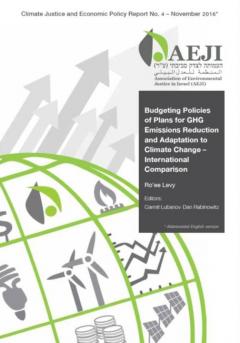
Budgeting Policies of Plans for GHG Emissions Reduction and Adaptation to Climate Change – International Comparison | Abbreviated English version
During 2016, substantial progress was made in the international effort to address climate change: the Paris agreement was ratified; a new international agreement was reached on mitigating GHG emissions in the aviation sector; and an amendment was made to the Montreal Protocol concerning the reduction of use of HFC chemicals that contribute to global warming.
However in Israel, efforts to mitigate GHG emissions and address adaptation to climate change are as yet insubstantial. This document examines budgetary indications related to climate change in a number of countries, in effort to study how the issue is prioritized and to learn lessons from international experience that might be pertinent to Israel's climate policy. It then continueBudgeting Policies of Plans for GHG Emissions Reduction and Adaptation to Climate Change – International Comparison | Abbreviated English version
During 2016, substantial progress was made in the international effort to address climate change: the Paris agreement was ratified; a new international agreement was reached on mitigating GHG emissions in the aviation sector; and an amendment was made to the Montreal Protocol concerning the reduction of use of HFC chemicals that contribute to global warming.
However in Israel, efforts to mitigate GHG emissions and address adaptation to climate change are as yet insubstantial. This document examines budgetary indications related to climate change in a number of countries, in effort to study how the issue is prioritized and to learn lessons from international experience that might be pertinent to Israel's climate policy. It then continues the exploration of climate budgeting via its revenue potential, which can be increased as countries mitigate their emissions by means of carbon taxation or sale of emission permits. Almost all OECD countries presently implement carbon pricing policies.s the exploration of climate budgeting via its revenue potential, which can be increased as countries mitigate their emissions by means of carbon taxation or sale of emission permits. Almost all OECD countries presently implement carbon pricing policies.

